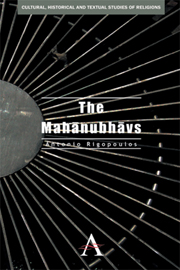Book contents
- Frontmatter
- Contents
- Dedication
- 1 Introduction
- 2 The Early Historical Background and the Mahānubhāvs' Foundational Texts
- 3 The Five Manifestations of the Supreme God Parameśvar
- 4 Elements of Mahānubhāv Doctrine
- 5 Mahānubhāvs' Practice: Devotion and Asceticism
- 6 Mahānubhāvs and Other Religions
- Bibliography
5 - Mahānubhāvs' Practice: Devotion and Asceticism
Published online by Cambridge University Press: 05 May 2012
- Frontmatter
- Contents
- Dedication
- 1 Introduction
- 2 The Early Historical Background and the Mahānubhāvs' Foundational Texts
- 3 The Five Manifestations of the Supreme God Parameśvar
- 4 Elements of Mahānubhāv Doctrine
- 5 Mahānubhāvs' Practice: Devotion and Asceticism
- 6 Mahānubhāvs and Other Religions
- Bibliography
Summary
As other bhakti sects, the Mahānubhāvs practise an exclusive devotion to one God, though not denying the existence of other gods. Mahānubhāvs, however, are different and separate from Mahārāṣṭrian Hindūs since they avoid all eclecticism restricting their worship to Parameśvar and his five manifestations. The ascetic must cultivate a burning longing (ārti) for Parameśvar. After Cakradhar's and Guṇḍam RāỊ's death, the essential mood of Mahānubhāvs' religious life has been ‘desolation’ (viraha) at the ‘absence’ (asannidhān) of God. The feeling of desolation is described as extremely intense: adepts are said to faint from grief, and some devotees become almost mad. Even if one dies or actively kills himself/herself out of suffering at Parameśvar's absence, he or she is said not to be subject to the consequences of suicide, normally leading to a hellish rebirth (Sūtra-pāṭh 10.232; 13.85). The theme of viraha is especially characteristic of Kṛṣṇa bhakti movements1 and the Mahānubhāvs are no exception (though their desolation is for Cakradhar and Guṇḍam RāūỊ's absence rather than for Kṛṣṇa's absence).
This theme of devotion to an absent God leads to a theological crux: how can one attain liberation if the ‘presence’ (sannidhān) of an avatār of Parameśvar is indispensable in order to attain it and yet no other avatār of Parameśvar has manifested since the end of the thirteenth century? A possible solution lies in the acceptance of Dattātreya's eternal avatārhood, given the popular belief that he unexpectedly manifests himself under disguise as an authoritative guru or yogin (Rigopoulos 1998: 100-101).
- Type
- Chapter
- Information
- The Mahanubhavs , pp. 73 - 86Publisher: Anthem PressPrint publication year: 2011



